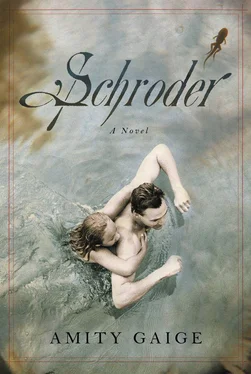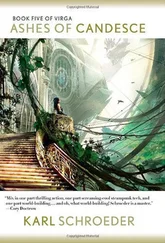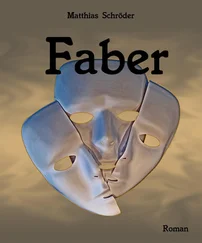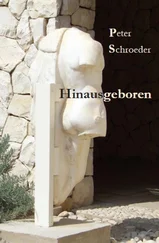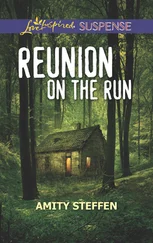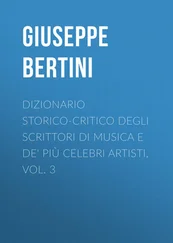The woman removed a case from her battered handbag and withdrew reading glasses. She peered down at the report.
“Your splints,” I said, finally unable to bear her silence. “Did you fall?”
She did not look up. “Repeated stress.”
I pushed forth my next bit of evidence. “Now, I’m just plain old bragging here, but I wanted to show you this piece of paper. Given to me when Meadow was three. The results of an IQ test, done over at the medical center, by old colleagues of mine, on a lark.”
A shadow of irritation crossed the woman’s face. I had the sense I should wrap it up.
“This material is significant only in that I feel, as a scholar myself — and I won’t bore you with the details of my own research here — I feel more than ever required as Meadow’s father. This gifted child needs two parents to — jointly, and with all the resources they can muster — lead her through—”
“Excuse me,” Ms. Vang said. “Where is the child?”
I blinked back at her. “Meadow? She’s here somewhere.”
“Because I’m here to observe the two of you. Together. You know, playing and stuff. Being together.”
“Of course.”
“I’m not a jury, Mr. Kennedy.”
“No, no you aren’t.”
“And I’m not inner ested in theories about parenthood.”
“No, of course not.”
I turned and scanned the playground desperately for Meadow.
“And with the divorce rate in the United States at about fifty percent,” she continued, picking up steam, “higher than any industrialized nation, I do brisk business. And mostly what I see in these custody battles are people who think too much. People who could easily sort out their differences if they weren’t so full of ideas . People who’d rather be right than happy.”
I stood, panicking now, the woman close at my side. Meadow was nowhere to be seen. She was not on the play structure, the rock climber, the swings. A stampede of young men with their shirts off blew through the playground, the Saint Rose cross-country team.
“This is awful,” I said, walking briskly downhill toward the water fountain, where I was sure I’d find Meadow petting the dogs. “Sorry to make you walk so much.”
Unsurprisingly, Ms. Vang withheld reassurance.
“Meadow is always wandering off. Just ask her mother. She’s always petting someone’s dog. Admiring someone’s bicycle.”
“Should watch out,” grumbled the woman, loping beside me. “What I’ve seen done to children would give you nightmares.”
“So how did you get into the business?” I asked.
“I started out in law enforcement.”
“Aha.”
“And then I was managing my father’s seafood business, but then he died.”
“Oh.”
“So I made lemonade. Went back to school. Found my calling.”
Several dogs nosed around in the fountain, their owners milling nearby. No Meadow. Finally, abandoning all pretense of composure, I cupped my hands around my mouth and shouted her name. People stared. A park attendant pruning rosebushes reached for his walkie-talkie. The barbarous woman who held my fate in her hands settled her buttocks down upon the granite rim of the fountain — built by some magnate in honor of his dead father — and looked at me with flat eyes, and I thought, Screw you, screw you, I never had a chance with you anyway.
And that’s when I saw my daughter. She had been very close to us all along, right over our heads, having climbed the large beech in which our kite was stranded. I could see her now clearly, now that I was so far away, at a distance that seemed to increase exponentially with my own dawning regrets. As she inched out on the branch, her hand seeking the kite string, her eyeglasses flashed in the sun. The lenses were like mirrors flashing code: Am completely confused. Will try this . She was a child in the sky. I had put her there. And although seeing her totter on the branch was a blow to me, I saw, as I never had, how much worse things could get.

The rest of the story can be told summarily.
Meadow did not fall. The kite was not retrieved. The independent evaluation was not favorable to me. Sensing a window, The Opposition regrouped, and meanwhile my weekend visitation came and went Meadowless, and there was nothing I could do about it, nothing whatsoever. Despite the fact that Thron told me the threat was ridiculous, that losing visitation altogether was impossible, I fell into a depression worse than the one that had brought me to him. For two weeks, I did not leave the house. Unless you count going to the liquor store and Dunkin’ Donuts. After a couple of angry calls, my last active client — a yogic master looking for commercial space — moved on to someone else.
May came. One morning I left the house and just started walking. I walked all the way down New Scotland, right into town, and several hours later found myself standing in front of the New York State Museum. With its top-heavy modern design, and hundreds of joggable stairs rising to a monumental balcony, the building is hard to miss. From the museum balcony, you can get a clear view of all four mountain ranges that surround the capital region: Adirondack, Green, White, and Berkshire. Everywhere up here, you’re surrounded by mountains.
I had not come to look at the mountains. This was more like a pilgrimage. My own personal Lourdes. Because this was the place where Meadow and I had spent so many days during my year at home with her. The year she was three. The year in which she learned to read. The year she learned to play the recorder, waltz, read the periodic table, and speak passable German. During that long northern winter, we’d gone to the library almost every day. I’d bring my research (sorry, as it turns out, I still don’t feel like talking about my research), and she would settle on the carpet nearby with crayons or a fan of books, and we’d spend companionable hours like that. At some point she would tug my pant leg and I would know it was time for a visit to the carousel.
What carousel? The one made a gift to the people of Albany by the people of our sister city, Ypres, in 1935. All its mirrors still intact, as well as the original, somewhat deafening organ, the carousel found its way into the New York State Museum in the 1970s. Boasting thirty-six horses, two deer, two donkeys, and one monkey, it’s worth a visit, if you’re in town.
The day I went to see the carousel alone, I noticed that the assortment of people waiting in line was the same as when Meadow and I had been among them — young parents absentmindedly bouncing babies, toddlers with their foreheads wedged between the railings. I thought about how the children were too young to understand the value of what was happening to them, which was that their minds were being imprinted by every scent, every touch, every sound, and that it was from this template they would draw for the rest of their lives. This is how the world would forever hit their nerves.
“How old?” I asked the young mother standing beside me.
The mother looked up from her baby. “Eight months,” she said.
“Very cute.” I pointed. “Is that a tooth?”
The young woman put her finger in the child’s mouth and swiped it. The baby’s eyes widened. “Nah. I don’t know what that is.” She fixed his tiny sweater.
“Well,” I said. “He’s a cute little guy.”
“I know he is.” She beamed, looking unaccountably beautiful.
Meadow’s favorite horse on the carousel was a black one with a golden saddle — the outside horse. I had stood beside it countless times. When she had first ridden the carousel, her waist was thick, a baby’s bubble of milk. But each time we returned to the carousel, her body was different. Her waist thinned, seemingly in my hands, and her legs lengthened and her shoes began to scrape me as they rose and fell, shod with hard plastic flats and ruffled socks. When she was little, she barely noticed me, so entranced was she by the lights and mirrors of the carousel. But as she grew older, even after she could safely ride the carousel by herself, she would ask me to stand beside her anyway, and I would whistle, and compliment her stallion, and she would look down at me, and I don’t think I ever felt gladder of anything, that a daughter of mine might be in the midst of a happy childhood — that elusive gold standard, a goddamned miracle.
Читать дальше
